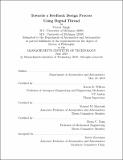| dc.contributor.advisor | Karen E. Willcox. | en_US |
| dc.contributor.author | Singh, Victor. | en_US |
| dc.contributor.other | Massachusetts Institute of Technology. Department of Aeronautics and Astronautics. | en_US |
| dc.date.accessioned | 2019-10-04T21:30:35Z | |
| dc.date.available | 2019-10-04T21:30:35Z | |
| dc.date.copyright | 2019 | en_US |
| dc.date.issued | 2019 | en_US |
| dc.identifier.uri | https://hdl.handle.net/1721.1/122373 | |
| dc.description | This electronic version was submitted by the student author. The certified thesis is available in the Institute Archives and Special Collections. | en_US |
| dc.description | Thesis: Ph. D., Massachusetts Institute of Technology, Department of Aeronautics and Astronautics, 2019 | en_US |
| dc.description | Cataloged from student-submitted PDF version of thesis. | en_US |
| dc.description | Includes bibliographical references (pages 141-148). | en_US |
| dc.description.abstract | Digital Thread is a data-driven architecture that links together information generated from across the product lifecycle. Though Digital Thread is gaining traction as a digital communication framework to streamline design, manufacturing, and operational processes in order to more efficiently design, build and maintain engineering products, a principled and unified formulation of the data-driven design problem using Digital Thread remains absent in the literature. Prior work on Digital Thread has targeted enterprise level risk/value assessments, addressing upcoming challenges and future visions, and establishing requirements from the vantage point of model-based systems engineering, product lifecycle management, and additive manufacturing. However, such a formulation must account for the fact that the design process is highly iterative and not all information is available at once. | en_US |
| dc.description.abstract | Design decisions must be made not only on what data to collect but also on the costs and benefits involved to collect those data. Furthermore, since full use of acquired information can become computationally prohibitive, it is important to evaluate what minimal information is sufficient for design decisions and in what form that information is needed. The contribution of this thesis is to present such a formulation from the context of a data-driven design and decision problem under uncertainty. In particular, we lay down a mathematical foundation for Digital Thread and develop an dynamical feedback process model that governs the mechanics of the data-driven design problem that uses Digital Thread. From this model, we construct a Bayesian filter that describes the overall data assimilation process and formulate a multistage optimization problem that produces optimal data-informed decisions with respect to specified cost and constraint metrics. | en_US |
| dc.description.abstract | A numerical approach based on function and policy approximation is detailed and an algorithm is provided to solve the multistage optimization problem. The overall methodology is illustrated on an example structural fiber-steered composite component. In this setting, the methodology enables design space explorations that assess the costs/benefits of future outcomes based on current design decisions. These design decisions can incorporate structural tailoring, sensor placement, and sensor selection in addition to fiber angle and thickness specification. Different design scenarios utilizing sensor placement and selection are compared and quantified. It is found that placement of sensors has less impact on cost than the choice of which sensors are used and how frequently. Accordingly, this method is able to assess how many sensors need to be used to resolve the dominant loading components effectively, and then use this knowledge to produce appropriate designs of low costs. | en_US |
| dc.description.sponsorship | "The work in this thesis was supported in part by AFOSR grant FA9550-16-1-0108 under the Dynamic Data Driven Application System Program (Program Manager Dr. E. Blasch); The MIT-SUTD International Design Center; and the United States Department of Energy Office of Advanced Scientific Computing Research (ASCR) grants DE-FG02-08ER2585 and DE-SC0009297, as part of the DiaMonD Multifaceted Mathematics Integrated Capability Center"--Page 9. | en_US |
| dc.description.statementofresponsibility | by Victor Singh. | en_US |
| dc.format.extent | 160 pages | en_US |
| dc.language.iso | eng | en_US |
| dc.publisher | Massachusetts Institute of Technology | en_US |
| dc.rights | MIT theses are protected by copyright. They may be viewed, downloaded, or printed from this source but further reproduction or distribution in any format is prohibited without written permission. | en_US |
| dc.rights.uri | http://dspace.mit.edu/handle/1721.1/7582 | en_US |
| dc.subject | Aeronautics and Astronautics. | en_US |
| dc.title | Towards a feedback design process using Digital Thread | en_US |
| dc.type | Thesis | en_US |
| dc.description.degree | Ph. D. | en_US |
| dc.contributor.department | Massachusetts Institute of Technology. Department of Aeronautics and Astronautics | en_US |
| dc.identifier.oclc | 1119721052 | en_US |
| dc.description.collection | Ph.D. Massachusetts Institute of Technology, Department of Aeronautics and Astronautics | en_US |
| dspace.imported | 2019-10-04T21:30:34Z | en_US |
| mit.thesis.degree | Doctoral | en_US |
| mit.thesis.department | Aero | en_US |
